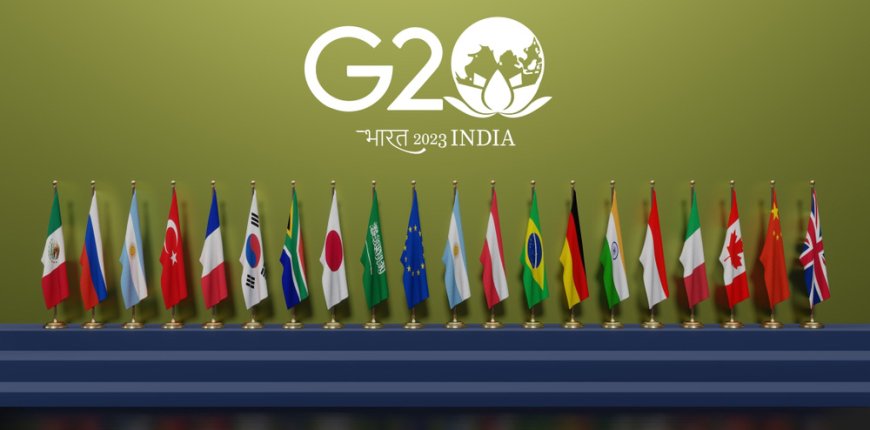Shaping Global Cooperation and Challenges – G20 Summit
The G20, or the Group of Twenty, is an influential international forum comprising 19 individual countries and the European Union. It serves as a platform for world leaders to collaborate and address global economic challenges through dialogue and cooperation. The significance of the G20 lies in its ability to foster international collaboration and collective decision-making to tackle pressing issues that transcend national borders. For More Information read full article Presented by examrewards.com

Shaping Global Cooperation and Challenges – G20 Summit
The G20, or the Group of Twenty, is an influential international forum comprising 19 individual countries and the European Union. It serves as platform for world leaders to collaborate and address global economic challenges through dialogue and cooperation. The significance of the G20 lies in its ability to foster international collaboration and collective decision-making to tackle pressing issues that transcend national borders. For More Information read full article now Presented by examrewards.com below
TABLE OF CONTENT
· INTRODUCTION
· HISTORY AND EVOLUTION
· OBJECTIVES AND FOCUSED AREAS OF THE G20 SUMMIT
· G20 IMPACT AND ACHIEVEMENTS
· CRITICISM AND CHALLENGES
· RECENT G20 SUMMIT AND OUTCOME
· CONCLUSION
Introduction:
In today's interconnected world, addressing complex global challenges requires collective efforts and collaboration among the world's major economies. The G20 Summit stands as a crucial forum for international economic cooperation and decision-making. In this blog, we will explore the G20 Summit in detail, including its history and evolution, objectives and focused areas, impact and achievements, criticisms and challenges, and a glimpse into recent G20 summits.
G20 Summit: Definition and Overview
The G20, or the Group of Twenty, is an international forum comprising 19 individual countries and the European Union. Established in 1999, it serves as a platform for leaders to address pressing global economic challenges and promote cooperation on various issues. The G20 member countries represent about 80% of the world's GDP and two-thirds of the global population, making it a highly influential forum for economic discussions and decision-making.
History and Evolution of the G20:
The history and evolution of the G20 can be traced back to the late 1990s and have evolved significantly over the years. Here is a detailed overview of the history and evolution of the G20:
Background and Formation:
In the aftermath of the Asian financial crisis in 1997-1998, it became evident that a more inclusive forum was needed to address global economic challenges effectively. The G7 group of advanced economies (Canada, France, Germany, Italy, Japan, the United Kingdom, and the United States) recognized the need to include major emerging economies in discussions about global economic issues. As a result, finance ministers and central bank governors from the G7 invited representatives from 11 major emerging economies to establish a new forum for economic cooperation.
First G20 Meeting:
The first meeting of the G20 was held on December 15-16, 1999, in Berlin, Germany. The member countries included the G7 nations along with Argentina, Australia, Brazil, China, India, Indonesia, Mexico, Russia, Saudi Arabia, South Africa, South Korea, and Turkey, as well as the European Union. Together, these countries represented about two-thirds of the world's population and 85% of the global GDP.
Early Role as a Finance Ministers Forum:
Initially, the G20 operated as a forum for finance ministers and central bank governors to discuss policy matters and coordinate efforts to stabilize financial systems. The meetings focused on addressing financial crises and fostering international economic cooperation.
Response to the 2008 Global Financial Crisis:
The turning point in the G20's history came in 2008 during the global financial crisis. As the financial crisis unfolded, the G20 leaders recognized the need for high-level political engagement to address the magnitude of the crisis effectively. Consequently, the G20 was elevated to a leader-level summit, bringing together heads of state and government for the first time.
Transformation into a Leader-Level Summit:
The G20's first leader-level summit was held on November 15-16, 2008, in Washington, D.C. The gathering brought together the leaders of the world's major economies to discuss coordinated responses to the financial crisis and chart a path towards global economic recovery.
Expanding Membership:
Over the years, the G20 has continued to expand its membership by including additional countries and international organizations. Spain, the Netherlands, and several international organizations such as the International Monetary Fund (IMF) and the World Bank participate in G20 meetings as guests. The presence of these organizations enhances dialogue and coordination between the G20 and other global economic institutions. Establishment of the Financial Stability Board (FSB): As part of the G20's response to the 2008 financial crisis, the Financial Stability Board (FSB) was established. The FSB is an international body that monitors and makes recommendations about the global financial system's stability. It plays a critical role in overseeing financial reforms and enhancing transparency and resilience in the financial sector.
Broadening Agenda and Focus Areas:
Over time, the G20's agenda has broadened to encompass various global economic and societal challenges. The forum now addresses issues such as international trade, climate change, sustainable development, digital economy, poverty, and inequality, alongside traditional economic and financial matters.
Objectives and Focused Areas of the G20 Summit:
The G20 Summit has several primary objectives, and its focus areas cover a wide range of global economic and societal challenges. The main objectives and focus areas of the G20 Summit include:
Economic Growth and Stability:
One of the primary objectives of the G20 Summit is to promote policies and strategies that foster sustainable economic growth and financial stability across member countries. This includes addressing issues such as fiscal and monetary policies, structural reforms, and macroeconomic coordination to stimulate economic activity and job creation.
Trade and Investment:
The G20 aims to encourage open and fair trade practices among member countries. It seeks to promote a rules-based multilateral trading system and address trade imbalances and protectionist measures. The forum emphasizes the importance of international trade and investment in driving global economic growth and development.
Climate Change and Sustainability:
Recognizing the urgency of climate action, the G20 engages in discussions on environmental sustainability and the transition to clean energy. It supports efforts to combat climate change, reduce greenhouse gas emissions, and promote sustainable development. Climate-related discussions and initiatives are a crucial part of the G20's focus areas.
Digital Economy:
With rapid advancements in technology, the G20 addresses the challenges and opportunities presented by the digital revolution. This includes discussions on data governance, cybersecurity, digital trade, and the impact of technology on economic growth and job creation. The G20 seeks to harness the potential of the digital economy while addressing associated challenges.
Poverty and Inequality:
The G20 recognizes the importance of inclusive growth and social development. It aims to reduce poverty and inequality by promoting policies that create equal opportunities for all citizens. Addressing social and economic disparities is a fundamental aspect of the G20's focus areas.
Financial Regulation and Stability:
Ensuring a stable and resilient global financial system is a critical objective of the G20. The forum actively engages in discussions on financial regulations, banking reforms, and measures to prevent financial crises. The establishment of the Financial Stability Board (FSB) is an example of the G20's efforts to enhance financial stability.
Health and Pandemic Preparedness:
The G20 has also been addressing global health challenges and pandemic preparedness, as demonstrated by its response to the COVID-19 pandemic. The forum discusses strategies to strengthen healthcare systems, support research and development for vaccines and treatments, and enhance international cooperation during health crises.
Anti-Corruption and Transparency:
Fostering transparency and combatting corruption are essential to promoting good governance and a level playing field for businesses. The G20 emphasizes the importance of measures to address corruption and promote integrity in public and private sectors.
G20 Impact and Achievements:
The G20 Summit has had a significant impact on global economic governance and cooperation. Over the years, it has achieved notable accomplishments in various areas. Some of the key impacts and achievements of the G20 Summit include:
Mitigating the Global Financial Crisis:
One of the most significant achievements of the G20 was its response to the 2008 global financial crisis. In the midst of the crisis, G20 leaders came together to coordinate a comprehensive and synchronized response to stabilize financial markets and prevent a more severe economic downturn. The G20's swift and coordinated action played a crucial role in restoring confidence in the global economy and laying the groundwork for recovery.
Establishment of the Financial Stability Board (FSB):
In the aftermath of the financial crisis, the G20 established the Financial Stability Board (FSB) in 2009. The FSB is an international body that monitors and makes recommendations about the global financial system's stability. It oversees financial reforms and promotes transparency and resilience in the financial sector, contributing to a safer and more secure global financial system.
Efforts to Address Tax Evasion and Avoidance (BEPS initiative):
The G20 launched the Base Erosion and Profit Shifting (BEPS) initiative to combat tax evasion and avoidance by multinational corporations. The BEPS initiative aims to ensure that companies pay their fair share of taxes and prevent them from exploiting gaps and mismatches in tax rules to shift profits to low-tax jurisdictions. This effort is essential in creating a level playing field for businesses and improving tax systems worldwide.
Advancements in Sustainable Development:
The G20 has increasingly prioritized sustainable development and climate change mitigation. G20 leaders have engaged in discussions on clean energy investments, promoting green finance, and supporting the implementation of the Paris Agreement. The G20's commitment to sustainable development goals reflects its recognition of the importance of environmental protection and inclusive growth.
Addressing Global Health Challenges (COVID-19 Pandemic):
In response to the COVID-19 pandemic, the G20 convened special summits to coordinate responses, support healthcare systems, and address economic recovery. Leaders pledged to provide financial assistance to developing countries, ensure equitable access to vaccines, and promote research and development for treatments. The G20's efforts to address the pandemic have been crucial in mitigating its impact on the global economy and public health.
Promoting Infrastructure Investment:
The G20 has emphasized the importance of infrastructure investment as a means to stimulate economic growth and development. Through the G20 Infrastructure means to stimulate economic growth and development. Through the G20 Infrastructure Initiative, member countries collaborate on enhancing the quality and accessibility of infrastructure projects, attracting private sector investment, and promoting sustainable infrastructure development.
Enhancing International Trade and Investment:
The G20 plays a significant role in promoting international trade and investment. It advocates for the removal of trade barriers, the reduction of protectionism, and the facilitation of cross-border trade and investment flows. The G20's efforts to enhance global trade have contributed to the growth of the global economy and job creation.
Fostering International Cooperation:
One of the most substantial impacts of the G20 is its ability to bring together leaders from major economies to foster international cooperation and dialogue. The G20 provides a platform for constructive engagement and consensus-building on global economic issues, leading to coordinated policy measures that have a broad and positive impact on the global economy.
Criticisms and Challenges
The G20 Summit, despite its significant achievements, has faced criticisms and challenges over the years. Some of the main criticisms and challenges of the G20 include:
Representation and Inclusivity Concerns:
One of the primary criticisms leveled against the G20 is its limited representation and inclusivity. While the forum includes the world's major advanced and emerging economies, it leaves out several significant countries, particularly from Africa and smaller nations. Critics argue that this lack of representation can lead to disparities in decision making and outcomes, as the interests of some regions and smaller economies may not be adequately considered.
Implementation of G20 Commitments:
While the G20 leaders often make commitments and agree on policy measures during the summits, ensuring the effective implementation of these commitments can be challenging. The G20 lacks a formal enforcement mechanism, and the implementation of agreed-upon policies largely depends on individual countries willingness to follow through. As a result, some commitments may not be fully realized or may face delays in implementation. Limitations of the Consensus-
Based Decision-Making Model:
The G20 operates on a consensus-based decision-making model, which means that all member countries must agree on any proposed measures. While this approach fosters collaboration and inclusivity, it can also lead to watered-down agreements and compromises. A single member's objection can prevent the adoption of specific policies, making it difficult to take bold and decisive actions on certain pressing issues.
Focus on Short-Term Economic Goals:
Critics argue that the G20's focus on short-term economic goals and crisis management sometimes leads to neglecting long-term structural issues. While addressing immediate economic challenges is crucial, some argue that the G20 should pay more attention to systemic economic issues and promote sustainable and inclusive growth in the long run.
Lack of Concrete Measures on Climate Change:
Despite acknowledging the urgency of climate action, some critics contend that the G20 has not done enough to address climate change effectively. While discussions on climate change and sustainable development are part of the G20's agenda, concrete and ambitious measures to combat climate change have at times been lacking or insufficiently emphasized.
Geopolitical Tensions:
As a forum for major economies with diverse geopolitical interests, the G20 sometimes faces challenges related to geopolitical tensions. Disagreements on issues such as trade, territorial disputes, and political ideologies can hinder effective collaboration and dampen the potential for achieving consensus on critical matters.
Lack of Civil Society Involvement:
The G20's decision-making process largely involves governments and policymakers, with limited involvement of civil society organizations and nongovernmental entities. Critics argue that including diverse perspectives from civil society could provide a more comprehensive understanding of global issues and lead to more inclusive and effective policy decisions.
Potential for Policy Incoherence:
With the G20 being a forum for multiple countries with diverse economic interests and priorities, there is a risk of policy incoherence. Different member countries may pursue different policy directions, leading to potential contradictions or conflicting strategies that can undermine the forum's collective impact.
Recent G20 summit and outcome
G20 summit in 2022, Bali, Indonesia
· There was a G20 summit in 2022, but it was held in Bali, Indonesia, on November 15-16, 2022. The theme of the summit was "Recover Together, Recover Stronger." The summit focused on the COVID-19 pandemic and its economic impact, as well as other issues such as climate change, sustainable development, and global governance.
· The summit was attended by the leaders of the G20 countries, as well as representatives from other countries and organizations. The leaders discussed a number of issues, including:
· The global economic recovery from the COVID-19 pandemic
· The need to increase access to COVID-19 vaccines
· The importance of sustainable development The need to address climate change
· The importance of global governance
· The summit ended with a joint statement from the leaders, in which they committed to working together to address the challenges facing the world. Here are some of the outcomes of the 2022 G20 summit:
· The leaders agreed to a $600 billion package to help developing countries recover from the COVID-19 pandemic.
· They also agreed to work together to increase access to COVID-19 vaccines.
· The leaders committed to taking action on climate change, including reducing greenhouse gas emissions. They also agreed to work together to strengthen global governance.
2021 G20 Rome Summit (October 30-31, 2021): Focus Areas:
The 2021 G20 Summit in Rome focused on addressing pressing global challenges, including the COVID-19 pandemic, climate change, and economic recovery.
Outcomes: COVID-19 Response: G20 leaders pledged to enhance global vaccine distribution and support the global vaccination effort to ensure equitable access to vaccines for all countries. Climate Change: The G20 leaders committed to tackling climate change and achieving carbon neutrality by mid-century. They also discussed measures to limit global warming to 1.5 degrees Celsius above pre-industrial levels. Debt Relief for Vulnerable Countries: The G20 extended the Debt Service Suspension Initiative (DSSI) to mid-2022, providing debt relief to vulnerable countries impacted by the pandemic.
2020 G20 Extraordinary Virtual Summit (March 26, 2020):
Focus Areas: The 2020 Extraordinary Virtual Summit was held in response to the global COVID-19 pandemic, with a focus on coordinated international efforts to combat the health and economic crisis.
Outcomes:
COVID-19 Response: G20 leaders committed to mobilizing resources to contain the pandemic and protect people's health. They pledged to support research and development for vaccines and treatments.
Economic Recovery: The G20 leaders discussed measures to support the global economy during the pandemic, including fiscal and monetary policy responses and support for affected sectors.
2019 G20 Osaka Summit (June 28-29, 2019):
Focus Areas: The 2019 G20 Osaka Summit covered various topics, including global economic growth, trade, sustainable development, and digitalization.
Outcomes:
Trade Disputes: G20 leaders emphasized the importance of open and free trade and supported the reform of the World Trade Organization (WTO) to address trade disputes more effectively.
Environment and Climate Change: The G20 reaffirmed its commitment to the Paris Agreement and discussed measures to address marine plastic waste and promote sustainable development.
2023 summit (New Delhi, India)
The G20 summit in 2023 will be held in India, on September 2-3, 2023. The theme of the summit is "Vasudhaiva Kutumbakam" or "One Earth, One Family, One Future." The summit will focus on inclusive economic growth, digital transformation, and climate action.
The summit will be hosted by the Indian Prime Minister, Narendra Modi. India's presidency began on 1 December 2022, leading up to the summit in the third quarter of 2023. The presidency handover ceremony was held as an intimate event, in which the G20 Presidency gavel was transferred from Indonesian President Joko Widodo to Indian Prime Minister Narendra Modi at the close of the Bali summit. Indonesia held the presidency in 2022. The summit will be attended by the leaders of the G20 countries, as well as representatives from other countries and organizations. The leaders will discuss a number of issues, including:
· The global economic recovery from the COVID-19 pandemic
· The need to increase access to COVID-19 vaccines
· The importance of sustainable development The need to address climate change
· The importance of global governance
The summit is expected to be a significant event, as it will bring together the leaders of the world's major economies to discuss the challenges facing the world. The summit is also expected to be a major opportunity for India to showcase its economic and political leadership on the global stage.
· Here are some of the possible outcomes of the G20 summit in 2023:
· The leaders may agree on a new global framework for economic cooperation.
· They may also agree on a new approach to climate change.
· The summit could also be a major opportunity for India to showcase its economic and political leadership on the global stage.
Conclusion
The G20 Summit serves as an indispensable forum for global economic coordination, fostering collaboration among the world's major economies to address pressing challenges. While it has achieved remarkable milestones in stabilizing the global economy, promoting sustainable development, and addressing various issues, it continues to face criticisms and challenges. Nevertheless, the G20 remains an essential platform for shaping the world's economic and political landscape, driving progress towards a more interconnected and prosperous future.




